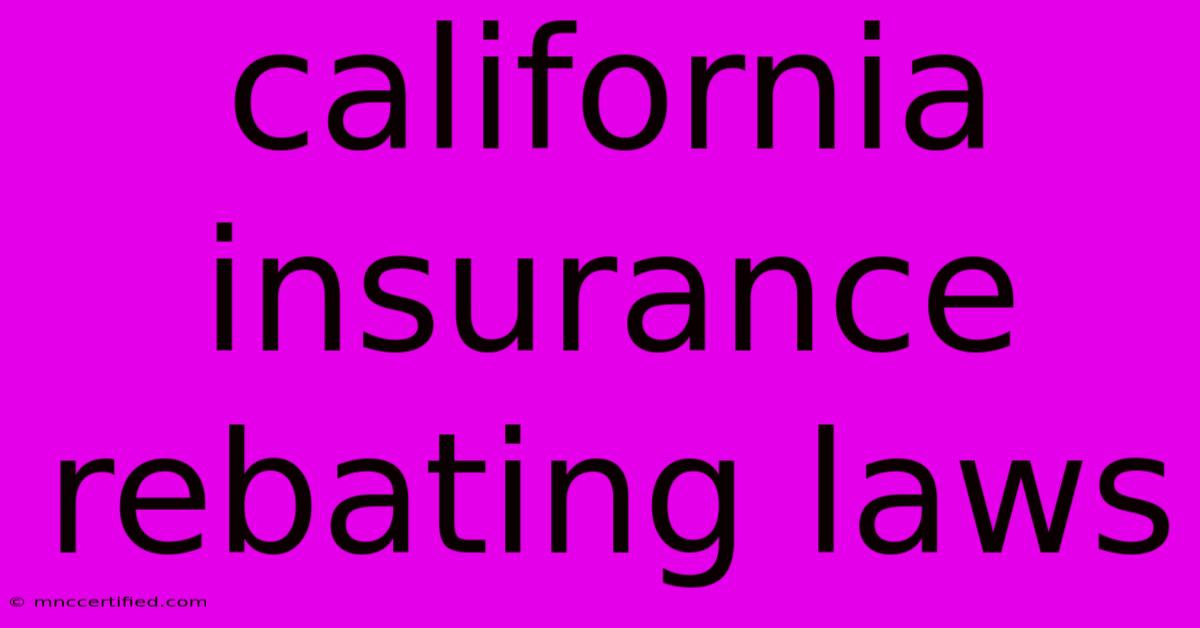California Insurance Rebating Laws

Table of Contents
California Insurance Rebating Laws: A Comprehensive Guide
California has strict laws against insurance rebating, designed to protect consumers and ensure fair competition within the insurance industry. Understanding these laws is crucial for both insurance agents and consumers to avoid legal repercussions and unethical practices. This guide will provide a comprehensive overview of California's insurance rebating laws, explaining what constitutes rebating, the penalties involved, and how to stay compliant.
What is Insurance Rebating in California?
Insurance rebating refers to any inducement offered by an insurance agent or broker outside of the officially stated policy premium. This "inducement" is given to influence a consumer's choice of insurance policy or company. It's illegal in California because it undermines fair competition and can lead to consumers choosing policies based on improper incentives rather than suitability.
The California Insurance Code explicitly prohibits rebating in various forms. This includes, but isn't limited to:
- Offering gifts or prizes: This can range from small items like pens and mugs to significant gifts like electronics or vacations.
- Providing cash back or discounts: Anything beyond the standard discounts offered by the insurance company itself is considered rebating.
- Offering services or favors: This could include anything from free home inspections to free travel arrangements.
- Splitting commissions with the insured: Sharing a portion of the agent's commission with the policyholder.
- Offering something of value to influence a policy choice. This is a broad category encompassing many potential situations.
Examples of Illegal Rebating in California
To further clarify, here are some specific examples of activities that would be considered illegal rebating under California law:
- An agent offering a $100 gift card to anyone who buys a car insurance policy through them. This is a clear violation, offering an incentive beyond the policy's stated cost.
- An insurance broker promising a free vacation to a client who switches their life insurance policy to their company. This is a significant inducement designed to sway the client's decision.
- An agent secretly reducing their commission to offer a lower premium to a client without the insurance company's knowledge. This is a form of hidden rebating and is illegal.
Penalties for Insurance Rebating in California
The consequences of engaging in insurance rebating in California can be severe. Penalties can include:
- Fines: Significant financial penalties can be levied against both the agent and the insurance company involved.
- Suspension or Revocation of License: Insurance agents found guilty of rebating may have their licenses suspended or revoked, effectively ending their career in the industry.
- Criminal Charges: In some cases, particularly involving significant or repeated offenses, criminal charges could be filed.
- Civil lawsuits: Consumers who have been victims of rebating may be able to sue the agent or broker for damages.
How to Avoid Rebating Violations
Both insurance agents and consumers should be aware of the potential pitfalls of insurance rebating. Here are some best practices to ensure compliance:
- Agents: Strictly adhere to the stated premiums and discounts offered by the insurance company. Clearly disclose all commissions and fees. Avoid offering any incentives outside of what’s officially approved.
- Consumers: Be wary of any unusually generous offers or incentives from insurance agents. Report suspicious activities to the California Department of Insurance.
Reporting Insurance Rebating in California
If you suspect insurance rebating, you can report it to the California Department of Insurance. They have a dedicated process for handling such complaints, ensuring investigations are conducted efficiently and fairly. Their website provides detailed information on how to file a complaint.
Conclusion
California’s insurance rebating laws are designed to protect consumers and maintain a fair and competitive insurance market. Understanding these laws is critical for all stakeholders to avoid legal penalties and ethical breaches. By following best practices and reporting suspected violations, we can contribute to a more transparent and trustworthy insurance industry in California. Remember, compliance is key to maintaining a successful and ethical practice in the California insurance market.

Thank you for visiting our website wich cover about California Insurance Rebating Laws. We hope the information provided has been useful to you. Feel free to contact us if you have any questions or need further assistance. See you next time and dont miss to bookmark.
Featured Posts
-
Ohio State Northwestern Game Time And Stream
Nov 17, 2024
-
Final Betting Odds Lsu Florida Game
Nov 17, 2024
-
Tottenham 0 3 Arsenal Wsl Match Report
Nov 17, 2024
-
Australia Beats Pakistan By 13 Runs
Nov 17, 2024
-
Can Insurance Cover Masseter Botox
Nov 17, 2024